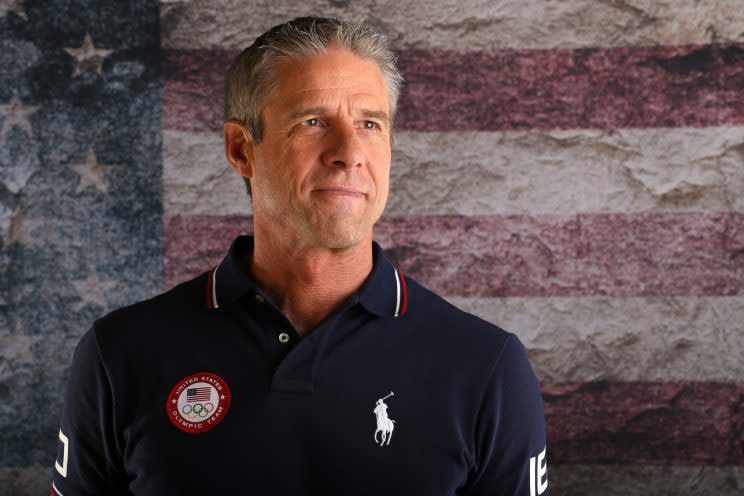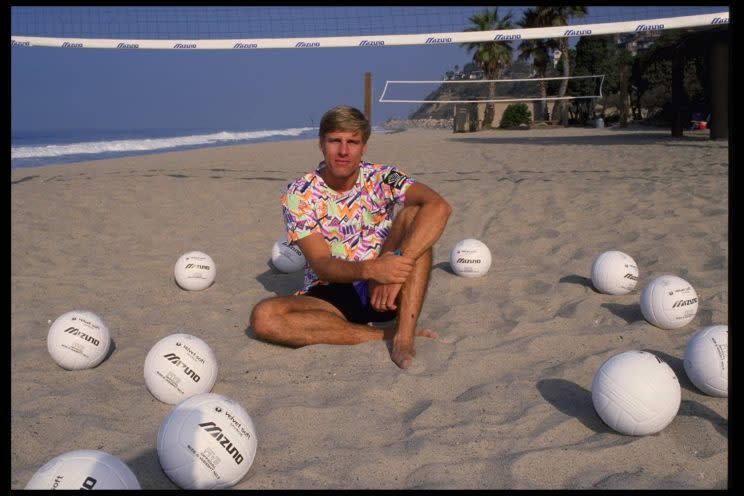Olympic volleyball icon Karch Kiraly goes for gold as women’s coach

Getty Images
RIO DE JANEIRO – The film was called ‘Spiker.’
Karch Kiraly estimates it lasted only a few days in U.S. movie theaters back in 1986, at a time when Olympic volleyball players had the celebrity status to earn cameo roles and talk show appearances. Patrick Houser – whom you may remember from “Hot Dog: The Movie,” playing at your local “frat comedies at ski resorts” festival – portrayed a character named ‘Catch’ Viecelli, which Kiraly said he inspired. In fact, his 1984 Los Angeles Summer Games gold medal-winning indoor volleyball team inspired the entire film.
Players from that team were extras in “Spiker,” recalled Kiraly. “Our job on the movie was to be the background volleyball players for the actors, many of whom needed mini-trampolines to get off the ground and make it look legit,” he said, smiling.
Years later, Kiraly moved from the background to the foreground as “Kurt Stevenson,” a beach volleyball player on an episode of – what else? – TV’s “Baywatch.”
The point is that Karch Kiraly was, and is, in that rarified echelon of Olympic athletes who not only cultivate a cult of celebrity but who can be considered among the legends in their sports. He has three gold medals, and is the only volleyball player in history to earn them on the court and on the beach. The Fédération Internationale de Volleyball named him the greatest volleyball player of the 20th Century.
All of this makes him a rather interesting rookie head coach at the Rio Olympics, as Kiraly leads the U.S. women’s indoor team into the Games as its prohibitive favorite along with host Brazil.
Can Karch Kiraly become that rarest of the rare in sports: The star athlete who later excels as a head coach?
***
Going from the Hall of Fame as a player to behind the bench has produced some putrid results.
Wayne Gretzky never made the playoffs in four years as a coach. Neither did Ted Williams as a baseball coach. The less said about Mike Singletary’s career as an NFL coach, the better for the sanity of 49ers fans.
“You’re right,” conceded Christa Dietzen, who plays middle blocker on the U.S. women’s indoor team. “Not many great players can become great coaches.”
So what’s different about Kiraly?
Perhaps the Olympics, and a tournament format, work better for a former star player than the grind of a regular season.Kiraly relies on his veteran players for leadership, relies on the team chemistry to execute their game plans. They rely on him to understand, and guide them, through an event he’s participated in since 1984.
“He’s been in our shoes. He’s dealt with these pressures. He’s competed on the stage that we’re competing on. What his past as been as a player,” said Dietzen.
His past as a player is actually recent history.
Kiraly played competitively until he was 47 years old, finally retiring from the AVP tour in 2007. Coaching wasn’t something on his radar, until it became a necessity – not for him, but for his children’s sake.
His son, Christian, was a freshman volleyball player for Saint Margaret’s Episcopal School in San Juan Capistrano. “They had a really, really rough season. Lost every match. Lost every set of every match,” said Kiraly, who estimated that record was 0-93. “So my wife told me that I needed to help them out. Help to see if they could have something more than a perfectly abysmal season.”
With his other son, Corey, joining the team as a freshman in the next season, Kiraly asked if he could help out the school. He became their head coach, and within a few seasons the team won the Div. 5 championship for smallest-sized school. “They learned you can start from the absolute bottom and find success if you work hard,” recalled Kiraly.
With that, he had the coaching bug. “As you can see looking around this tournament, I’m rather young in coaching years,” he said.
He latched on with the USA women’s indoor team for the London Games, coaching with Hugh McCutcheon, who left after the 2012 Olympics to coach at the University of Minnesota.
Kiraly said taking over from him was “an easy decision” for him.
“Huge amounts of learning under Hugh. And I really like working with this group of incredible, talented, hard-working and dedicated women,” he said.
With that, he began his quest to lead the program where no U.S. women’s indoor volleyball team has gone before.

A lot has change since Kiraly burst onto the scene in 1984, for the sport and the Olympics. Thirty years ago, players weren’t wearing apps on their wrists that allowed them to count how many jumps they took in practice – something Kiraly and his staff encouraged his players to do this season. Thirty years ago, the Olympics weren’t nearly as organized on the athletes’ side as they are today.
“Each organizer learns from the previous organizer. Looking back at what it was like in 1984,” he said, with a chuckle, “and looking at the logistics of what they do now … I mean, the giant meal hall where they feed something like 20,000 people in the Olympic Village. I can’t even imagine something like that.
“One of the things we take pride in is being learners. Be better at something the next time you do it.”
It’s a motto the players follow, which is expected when they’ve consecutive gold medal matches to Brazil in 2008 and 2012 by identical 3-1 scores. Four veterans are back from that team — middles Foluke Akinradewo and Dietzen, outside hitter Jordan Larson and setter Courtney Thompson are back from the silver medalist team.
Now they have a chance to take gold from Brazil on their home court, in a nation where volleyball ranks behind only soccer in popularity.
Dietzen recalled a 2012 Grand Prix match in Brazil when the home fans “were so passionate and loud in the gym” that when she stepped off the court for a timeout, she couldn’t hear herself think.
“We’ve played in some gnarly environments,” she said. “You build and you learn from each one of those experiences. The court’s the same size. The ball hasn’t gotten any smaller.”
And if Team USA can overcome their Olympic tormentors from Brazil, it would mean their first gold medal in program history – the event has existed since 1964 – and a fourth gold medal in a third distinct way for their superstar coach: Indoor men’s player, beach men’s player and women’s coach.
“I don’t know what it’ll mean for me. I don’t know if it’s going to take 100 years or less than a month for the USA women to stand on top of the podium. But that’s what we’re aspiring to,” Kiraly said.
“But the more we think about that, the less chance that it’ll happen.”
—
Greg Wyshynski is a writer for Yahoo Sports. Contact him at puckdaddyblog@yahoo.com or find him on Twitter. His book, TAKE YOUR EYE OFF THE PUCK, is available on Amazon and wherever books are sold.



